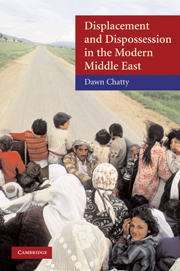Book contents
- Frontmatter
- Contents
- List of Tables
- List of Charts and Maps
- Acknowledgements
- Introduction: Dispossession and Forced Migration in the Middle East: Community Cohesion in Impermanent Landscapes
- 1 Dispossession and Displacement within the Contemporary Middle East: An Overview of Theories and Concepts
- 2 Dispossession and Forced Migration in the Late Ottoman Empire: Distinct Cultures and Separated Communities
- 3 Circassian, Chechnyan, and Other Muslim Communities Expelled from the Caucasus and the Balkans
- 4 The Armenians and Other Christians: Expulsions and Massacres
- 5 Palestinian Dispossession and Exodus
- 6 Kurds: Dispossessed and Made Stateless
- 7 Liminality and Belonging: Social Cohesion in Impermanent Landscapes
- Bibliography
- Index
Introduction: Dispossession and Forced Migration in the Middle East: Community Cohesion in Impermanent Landscapes
Published online by Cambridge University Press: 05 June 2012
- Frontmatter
- Contents
- List of Tables
- List of Charts and Maps
- Acknowledgements
- Introduction: Dispossession and Forced Migration in the Middle East: Community Cohesion in Impermanent Landscapes
- 1 Dispossession and Displacement within the Contemporary Middle East: An Overview of Theories and Concepts
- 2 Dispossession and Forced Migration in the Late Ottoman Empire: Distinct Cultures and Separated Communities
- 3 Circassian, Chechnyan, and Other Muslim Communities Expelled from the Caucasus and the Balkans
- 4 The Armenians and Other Christians: Expulsions and Massacres
- 5 Palestinian Dispossession and Exodus
- 6 Kurds: Dispossessed and Made Stateless
- 7 Liminality and Belonging: Social Cohesion in Impermanent Landscapes
- Bibliography
- Index
Summary
The problem today is that scholarship has had thrust upon it the necessity of partisan practice, and about this I would like to be very exact. When power of any sort, be it political, professional or institutional takes a hostile stance toward certain directions of study and the results of such study, then scholars can no longer pretend to escape political consequences. Antigone might wish only to give her brother decent burial, but Creon has ruled otherwise and, like it or not, she is forced to perform her private duties within a context defined by the king. This is what I mean by “political intrusion” by now a nearly universal affliction in private as in public lives, for men and women dedicated to knowledge no less than for men and women committed to action. The curse is general, and scholars are neither immune nor exempt.
(Des Pres 1988:11)Although academics seek to be objective in their research, I can think of few fields of study more affected by partisanship than forced migration. The very nature of the phenomenon cries out for moral positioning; that a people's dispossession and ensuing suffering should be recognized and, whenever possible, made less painful. Such a stand leaves to one side any judgements regarding the causes of the dispossession, the rights and wrongs of the events leading up to the forced migration, and the national and international politics which often underwrite these events.
- Type
- Chapter
- Information
- Publisher: Cambridge University PressPrint publication year: 2010



